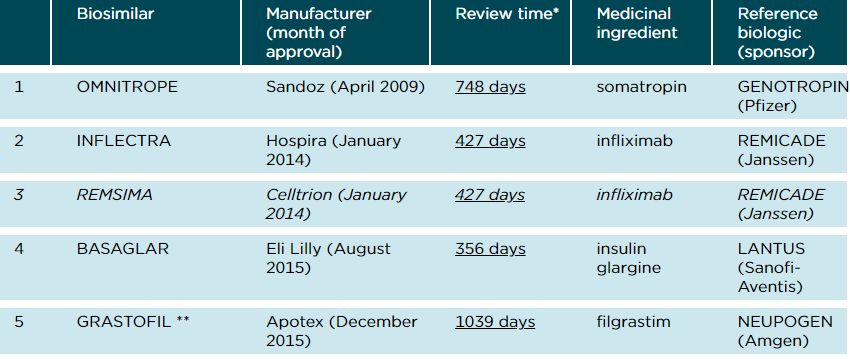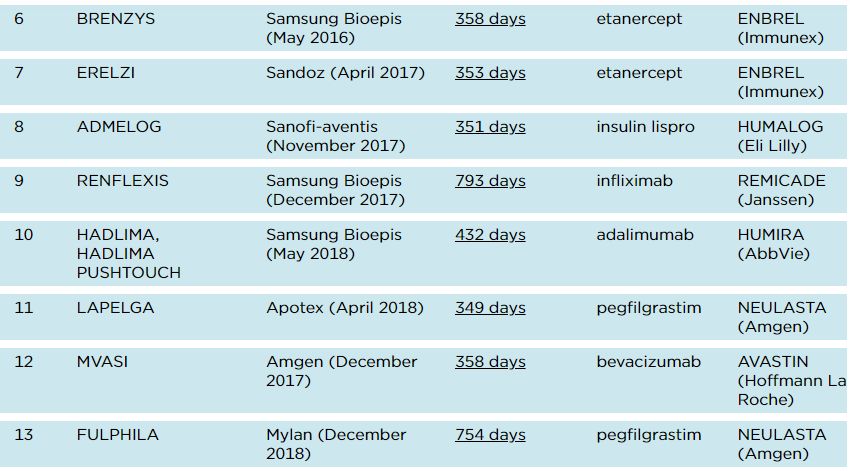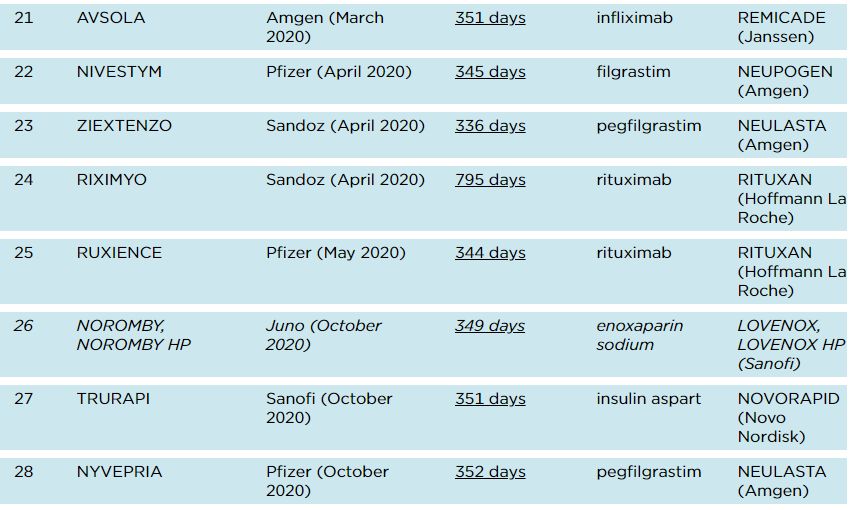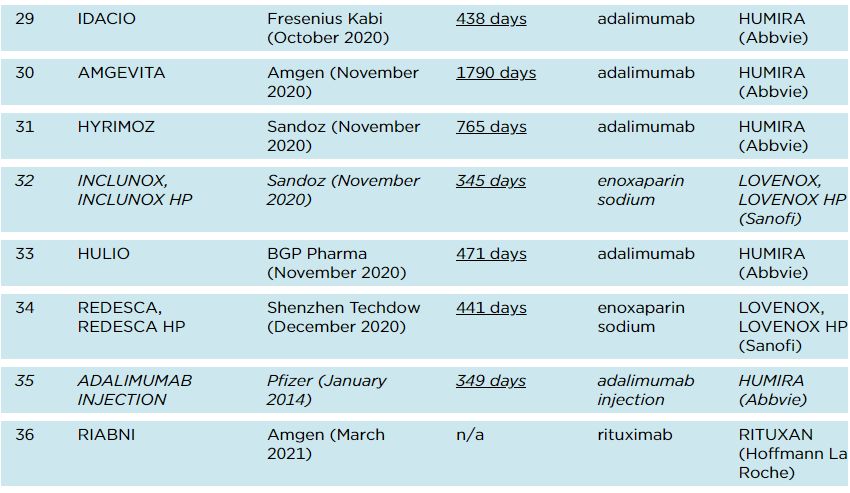- with readers working within the Pharmaceuticals & BioTech industries
To read a more recent update: Update on biosimilars in Canada - October 2021.
The following provides an overview of the many developments regarding biosimilars in Canada (approvals, pending submissions, regulatory, litigation and market access) that have taken place since our last update in August 2020.
Biosimilars approved in Canada
Since our last update in August 2020, Health Canada approved 11 biosimilars of 5 innovator products. This includes approval of 2 biosimilars of 2 innovator products in 2021.
This brings the total Health Canada approvals to 36 biosimilars of 14 innovator products. The complete list is below (italicized products are not yet marketed):
* Review time calculated from date of filing to the earlier of the date approval and IP hold, where available

** Calculated based on the IP hold date (May 21, 2015) in Apotex's statement of claim in Court File No. T-934-16.




Biosimilar submissions under review
Health Canada provides a monthly update of new drug submissions under review (SUR). Since October 2018, the SUR has indentified the sponsor, the filing date, and the submission class of the submission, including whether it is a biosimilar. The most recent SUR (as of April 23, 2021) identifies the following biosimilar submissions under review, which includes submissions on IP hold, with the number of submissions listed in brackets:
- Adalimumab (2)
- Bevacizumab (5)
- Etanercept (1)
- Filgrastim (1)
- Infliximab (1)
- Insulin aspart (1)
- Pegfilgrastim (1)
- Trastuzumab (1)
There are also 3 new drug submissions pending for trastuzumab, which are likely biosimilars, but are not specifically identified as such as they were filed prior to October 2018.
Biosimilar Litigation
Filgrastim and pegfilgrastim:
- In November 2020, the Federal Court of Appeal upheld the decision invalidating Amgen's patent relating to the filgrastim drug NEUPOGEN in an action relating to Pfizer's biosimilar NIVESTYM (as we reported here). Amgen has sought leave to appeal to the Supreme Court. Pfizer's action for section 8 damages remains pending.
- Amgen has three pending pegfilgrastim biosimilar actions under the amended PMNOC Regulations against Pfizer (NYVEPRIA), Purdue Pharma (PELMEG), and Sandoz (ZIEXTENZO). The trial in the action against Purdue Pharma remains scheduled for October 2021. The other two actions have been adjourned pending Amgen's appeal in the NIVESTYM proceeding, above.
Infliximab:
- In the patent infringement action between Janssen and Hospira relating to the biosimilar INFLECTRA, as reported here, the Federal Court of Appeal remitted issues of anticipation and obviousness for reconsideration to the trial judge. On January 12, 2021, the Federal Court issued its decision on the reconsideration, finding again that the patent is valid (see our article here). Hospira has appealed. A decision is pending in the remedies phase of the action.
Adalimumab:
- Fresenius Kabi markets IDACIO, a biosimilar of HUMIRA. In 2019, Samsung Bioepis brought an action for a declaration that its biosimilar HADLIMA would not infringe Fresenius Kabi's patent, and that the patent was invalid. Samsung Bioepis had received its NOC for HADLIMA in 2015, and began marketing in February 2021. In March 2021, Fresenius Kabi brought an infringement action against Samsung Bioepis regarding the same patent. It is believed that this is the first biosimilar vs. biosimilar patent litigation in Canada.
- In April 2021, AbbVie (sponsor of reference biologic HUMIRA) commenced actions under the Patented Medicines (Notice of Compliance) Regulations against JAMP Pharma regarding its biosimilar SIMLANDI. JAMP Pharma then started separate actions against AbbVie seeking declarations of non-infringement and invalidity regarding the same patents. All other patent litigation between AbbVie and other biosimilar manufacturers has been discontinued.
Regulatory
Health Canada has posted a Regulatory roadmap for biologic (Schedule D) drugs in Canada, a compilation of information about the regulation of biologic drugs for human use in Canada.
Market Access
As reported in our previous updates, in Ontario, the reimbursement criteria for biosimilars for infliximab, etanercept, filgrastim and rituximab are less restrictive for most indications as compared to the reference biologic. This is explicitly stated in the Biosimilar Policy and the Reimbursement of Biologic Originators through The Exceptional Access Program Reimbursement (at page 5 of Exceptional Access Program Reimbursement Criteria for Frequently Requested Drugs). This policy was similarly implemented for recently funded adalimumab biosimilars (Notice and FAQ) and the insulin lispro biosimilar (Notice and FAQ). Notably, Ontario does not require treatment-experienced patients to switch. However, patients who are treatment-naïve will only be funded for the biosimilar for its Health Canada approved indications.
In 2019, British Columbia PharmaCare instituted the Biosimilars Initiative for Patients to switch patients from certain reference biologics to biosimilars for certain indications. Most PharmaCare patients have been switched to biosimilars of etanercept, infliximab, insulin glargine and riuximab. Most recently, the initiative requires switching to biosimilars of adalimumab and etanercept (for an additional indication not previously included in the Initiative) by October 6, 2021.
Pursuant to Alberta's Biosimilars Initiative, patients were, and continued to be, switched from the reference biologic to a biosimilar for certain indications (most recently, for an additional indication for etanercept by May 1, 2021.)
New Brunswick has also now launched a Biosimilars Initiative. Between April 21 and November 30, 2021, patients who use six different biologic reference molecules (adalimumab, etanercept, infliximab, insulin glargine, insulin lispro, and rituximab) for various indications must switch to a biosimilar to continue their coverage.
Should you have any questions, please do not hesitate to contact a member of the Life Sciences Regulatory & Compliance group.
Originally Published 30 April, 2021
The preceding is intended as a timely update on Canadian intellectual property and technology law. The content is informational only and does not constitute legal or professional advice. To obtain such advice, please communicate with our offices directly.

